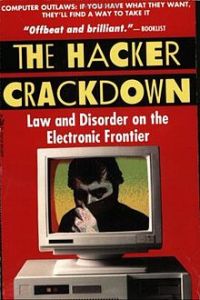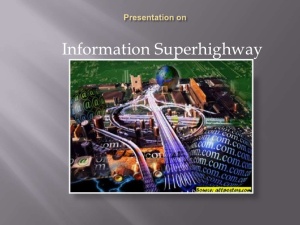Bruce Sterling wrote, “The Hacker Crackdown”, in 1992 and published it as an ebook; let’s remember that this was before there were browsers and the Internet was mostly an academic domain. In order to read this ebook, you would have to find it available on a Bulletin Board System (BBS) and downloaded it as a file to your local machine, then read it through the text editor of your choice, and not on your tablet or phone…because those didn’t exist yet. Maybe if you were really cutting edge, you might have read it on your DD8 Data Diskman that you had picked up for a steal for 900 bucks…in 92 dollars. The central event explored in “Hacker Crackdown” consists of a nation wide AT&T phone outage that occurred on January 15th, 1990 and the subsequent action taken by AT&T and the American government, culminating in Operation Sundevil which was basically a witch hunt.
Last night, due to a bought of insomnia, I pulled up this historical document on my tablet and read the first 200 pages. I’ve never really cared for Sterling’s science fiction, but this piece of journalism is amazing. As I was reading through it, I kept wondering who his audience was: how did he imagine his reader. He is obviously biased toward the young “hackers” who were being targeted, harassed, and ultimately imprisoned by the US government, and refers to the tech unsavy, politically conservative adversaries of these young people as “straights”. So why do we get explanations of basic concepts: what “cyberspace” is; history of the word “hacker”; the basic concept of how a telephone exchange routes calls, and why a fully computerized switching system would be superior to a human operated one; what a BBS is and how it works, etc.? One would assume that his audience would know these things, and that the “straights” wouldn’t be part of his audience. Who was buying this book when it came out, or downloading it and reading it on their computer? Wouldn’t they know what a BBS was since they just used one to get access to the book?
At first glance, it might seem like Sterling made the mistake of shooting too wide, trying to please everyone with his piece of reportage. But we live in a time now where a lot people don’t know what a BBS is, let alone ever used one. (side note: check out the BBS documentary to learn more about that). The focus of the tech-biosphere has switched away from telephones and telephony: these technologies still exist, but they are no longer the focus. Our view and praxis of how we communicate with each other is radically different. And THAT is exactly what makes this such a great historical perspective: an in-depth discussion that assumes you have little to no context for the events on the table. Just check out this description of what cyberspace is:
“A science fiction writer [William Gibson in “Neuromancer”] coined the useful term “cyberspace” in 1982, but the territory in question, the electronic frontier, is about a hundred and thirty years old. Cyberspace is the “place” where a telephone conversation appears to occur. Not inside your actual phone, the plastic device on your desk. Not inside the other person’s phone, in some other city. THE PLACE BETWEEN the phones. The indefinite place OUT THERE, where the two of you, two human beings, actually meet and communicate.”
Now, “Cyberspace” pretty much went to the same place as “the Information Super-highway”: people who didn’t really understand what they were talking about kept throwing it around until the people who DID know what they were talking about stopped using for fear of sounding like the former. But I love this definition, and I think it’s still relevant. In fact, I would say that we have shifted from spending a rather limited amount of time in cyberspace to spending the majority of our time in cyberspace. Every time you take your cell phone out of your pocket to check email, social media, text messages, or just launch a mobile browser to google something, you are transported from the place you are physically into cyberspace. The physical space has switched from mandatory to optional. Bored with standing in line at the grocery store? Off to cyberspace. No longer the part of a conversation at a dinner party? Off to cyberspace. As a guess, I bet we collectively spend more time in cyberspace, than we do in meat space. In “The Hacker Crackdown” we get a great exploration into what people were thinking about cyberspace in 1992, but from our 2015 perspective. Just for that, it’s worth your time. I’m not sure were media scholars, or the academic people who think about things like this, have gone with this theme, but it seems like the public discussion has become quieter as the novelty of the technology has worn off, and the Internet is increasingly seen like running water, or electricity: technologies that few people understand, and that require massive amounts of engineering expertise to build and maintain, but that most take for granted. In Sterling’s work we get a glimpse of what this connectivity looked like at the beginning.
As a collective society, we no longer see hackers as hyper-intellegent adolescents bent on anarchy and destruction. The day of putting a 16 year old kid in solitary confinement for 6 months because the judge has been convinced that said kid could start world war III from a payphone are, thankfully, behind us. The idea of hacker has morphed more into the Nigerian scammer, or the off-shore identity thief. Internet technologies are no longer as difficult to use or operate as BBSs. The “global voice for everyone” that Sterling talks about in reference to BBSs is here with the web and in a way that Sterling only got a glimmer of. Look! I’m using it right now! It IS a little humorous to hear him gushing about the BBS as a publishing platform when I can publish content from my phone that is far easier to consume than BBS text files; and I’m sure that Sterling would be the first to laugh. He loves dead media. But, if you’re interested in that weird boundary period–that twilight between the pre-connected, mass media, one-way-push from producer to consumer world, and the one we currently inhabit of constant connectivity and a flood of content from everyone who has access to a computer and network connection–then I suggest you take the time to read this gem. You can find it on Project Gutenberg here. If you would like to learn more about the term “hacker” and how it was co-opted to represent a certain sub-set of society, check out Jason Scott’s page about the subject here.



Post a Comment